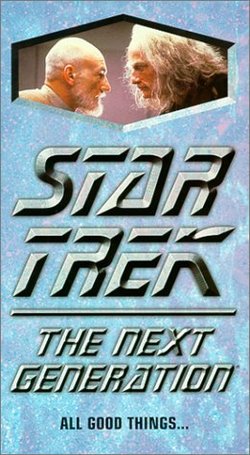All Good Things... (TNG episode)
|
|
"All Good Things..." was the final episode of Star Trek: The Next Generation. It was originally shown on May 29, 1994 and, like the first episode of the series, "Encounter at Farpoint", was a two-hour episode that in syndication is most often shown as two one-hour episodes. "All Good Things..." serves as the closure of the first episode's trial of the USS Enterprise-D by the nigh-omnipotent being Q.
It is early morning on the Enterprise on stardate 47988, so this episode begins late in the year 2370. Deanna Troi and Lieutenant Worf are about to kiss when Picard comes from the turbolift, seeming disoriented. Picard asks them what day it is, and when he finds out, he tells Troi and Worf that he's traveled in time and doesn't know why.
By the time Picard arrives in Sickbay, he has bodily and consciously jumped back six years in the past, just before he took command of the Enterprise. The dialogue between himself and Tasha Yar, his then-chief of security, seems to confirm that "Encounter at Farpoint" was the first mission of the Enterprise-D.
Another time-travel episode takes him to 2395, where Picard is an old man tending his vineyards and has a respected career as captain, admiral, and Federation ambassador behind him. In the field he meets Geordi La Forge, who's now a novelist with a wife and three children. When Picard hesitates and admits to Geordi that he's seeing and hearing people who aren't there (actually individuals from the 21st century trial scene in "Encounter at Farpoint"), Geordi suggests that Picard's irumodic syndrome, a neurodegenerative disease he's had for years, is responsible.
Subsequent timejumps convince Picard that he's not imagining things, and in 2370 Dr. Crusher finds that his brain has stored two days' worth of memories. Orders from Admiral Nakamura at Starfleet Command take the Enterprise to the Devron system on the edge of the Romulan Neutral Zone, where the Romulans are assembling ships in the wake of a newly-discovered temporal anomaly.
Back in 2364 on the maiden voyage of the Enterprise, Picard diverts the ship from its Farpoint rendezvous to the Devron system to investigate a temporal anomaly also forming there. Once he's returned to 2395, he convinces Data, now Cambridge's Lucasian Professor of Mathematics, Geordi, Captain Beverly Picard (Jean-Luc's ex-wife in this timeline) of the medical ship USS Pasteur, and Governor Worf to accompany him to the Devron system, which is now held by a hostile Klingon Empire.
The present-day Picard (of 2370) then appears in the trial chamber where Q accused him and by extension humanity of being a savage race six years earlier. Q tells Picard that he will destroy humanity, or perhaps has already destroyed them, and that Q is allowing Picard to travel through time to figure out how he does this. Relating his experience to his senior staff (of 2370), he proceeds to the Devron system knowing that the anomaly now forming there is something he caused. In the future, when the Pasteur arrives at the Devron system, they find nothing. But on the Enterprise of 2364, the anomaly is larger than it is in Picard's present. Back in the future, two Klingon vessels decloak and attack the Pasteur, which is narrowly saved by the intervention of Admiral Riker on board the 2395 version of the Enterprise. Q then takes Picard back to Earth four billion years ago, where the anomaly fills the Alpha Quadrant and prevents amino acids from forming proteins, thus preventing the formation of life on Earth (and likely the rest of the quadrant).
The 2395 Enterprise returns to the Devron system and discovers the anomaly forming. Inverse tachyon pulses projected from the main deflector dishes of the 2364 and 2370 Enterprises to study the interior of the anomaly are enabling the anomaly to grow in their own time periods. Time and anti-time are coming together inside the anomalies, and the resultant reaction will destroy everything by causing beings to revert to earlier forms of development. The pregnant Alyssa Ogawa loses her baby due to this cell reversion, and individual DNA is starting to break down due to the anomaly's anti-time effects.
Data and Geordi in 2395 deduce that the creation of a static warp shell in all three time periods inside their respective anomalies will cause them to collapse. Picard communicates this information to his counterparts, and each Enterprise enters its anomaly, which in anti-time becomes one anomaly. One by one, warp core breaches destroy the 2364, 2370, and 2395 vessels, and Q bids Picard farewell: "Good-bye, Jean-Luc, I'm gonna miss you. You had such potential. But then again, all good things must come to an end..."
Picard finds himself in the trial chamber once more. Q explains that sacrifice of the Enterprise and its crew in all three timelines, which the Q Continuum didn't think Picard had in him, has collapsed the anomaly, which now never was. So the events of this timeline will now unfold in a different direction from the one that created the 2395 timeline Picard interacted with. However, the real victory that justified the Continuum sparing Humanity was Picard's willingness to consider existential possibilities outside of his experience to solve the problem. In doing so, Picard demonstrated that Humanity is able to explore the profound nature of existence itself. The show – and the series – ends with the senior staff playing their weekly poker game, which Picard joins for the first time as the Enterprise sails off into the distance.
Early drafts of "All Good Things..." had a fourth timeline, corresponding to The Best of Both Worlds episodes. Another draft had the crew stealing the Enterprise from a space museum in the 2395 timeline.

